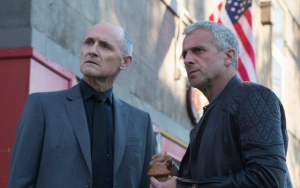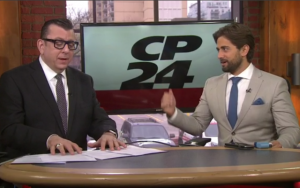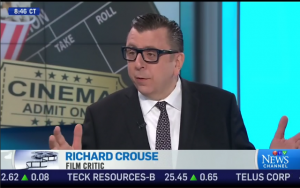 After an eleven-year the break emotional, brash French-Canadian cop David Bouchard (Patrick Huard) and cold, calculating Upper Canadian constable Martin Ward (Colm Feore) are back on the beat. Their original pairing, “Bon Cop, Bad Cop,” was a Two Solitudes parody that became one of the highest grossing Canadian films of all time. The new film changes their dynamic but keeps the corny cultural comedy.
After an eleven-year the break emotional, brash French-Canadian cop David Bouchard (Patrick Huard) and cold, calculating Upper Canadian constable Martin Ward (Colm Feore) are back on the beat. Their original pairing, “Bon Cop, Bad Cop,” was a Two Solitudes parody that became one of the highest grossing Canadian films of all time. The new film changes their dynamic but keeps the corny cultural comedy.
In “Bon Cop, Bad Cop 2” when the odd couple meet again Bouchard is working undercover with a ring of car thieves. Ward raids their chop shop hoping to nab two crime bosses but instead is reintroduced to his old friend. The straight-laced Ontarian fake arrests Bouchard to maintain his cover and the two get reacquainted.
Bouchard is still a hot-headed provincial police officer for the Sûreté du Québec while Ward has moved up. Now an officer with the Royal Canadian Mounted Police Ward has increased responsibilities and a compelling personal reason to follow this case to its conclusion. After clandestine meetings at curling rinks the two grudgingly decide to work together again but soon discover the car theft ring may have links to terrorism.
What to call “Bon Cop, Bad Cop 2”? It’s a buddy flick, a slapstick comedy, an equal opportunity caricature of Canadian stereotypes and a family drama. It is all that and yet, somehow less than the sum of its parts.
It is at its best when Feore and Huard are on screen together. The two spark, sparring over temperament, culture and even hockey but the film gets bogged down in details. You know what made “Law & Order” great? You never knew much about the personal lives of the characters. It was always about the case and not the periphery. “Bon Cop, Bad Cop 2” could have taken a page from that playbook. The script—written by Huard—errs on the side of sentimentality and is cluttered with family turmoil and illness instead of trusting the chemistry between the two actors to carry the story.
“Bon Cop, Bad Cop 2” is billed as a Canadian comedy but for every line like, “That’s not the best way to talk to a separatist with anger issues,” that connects with CanCon culture there are five that feel as though they were torn from the pages of any generic American cop story. The first film was ripe with clichés, but at least they were Canadian clichés.
Add to that a climatic action sequence that makes virtually no sense—instead of calling for back up they say things like, “We have no choice, no time to go for more help.” Do they not have cell phones in Quebec?—where they do everything in the most spectacularly hard way when easier and more obvious solutions are readily available. The action, and everything else, is played at a heightened level that plays into old fashioned stereotypes—small town Americans are dumb, Bouchard is playfully reckless and the single character of colour is a villain—that feels out dated and borderline offensive.
“Bon Cop, Bad Cop 2” leans toward the latter part of its title.
 Richard and CP24 anchor Jamie Gutfreund have a look at the weekend’s new movies, “Snatched” with Amy Schumer and Goldie Hawn, “Bon Cop, Bad Cop 2” with Patrick Huard and Colm Feore, “King Arthur: Legend of the Sword”and the sniper flick “The Wall.”
Richard and CP24 anchor Jamie Gutfreund have a look at the weekend’s new movies, “Snatched” with Amy Schumer and Goldie Hawn, “Bon Cop, Bad Cop 2” with Patrick Huard and Colm Feore, “King Arthur: Legend of the Sword”and the sniper flick “The Wall.”

